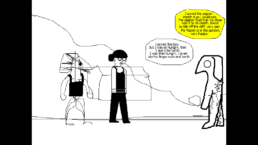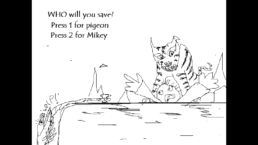The Missing Pharaoh
Nilson Carroll
An untamed digital parade of pixel hieroglyphs streams across my monitor in Jake Clover’s latest poetic short game, The Missing Pharaoh. As always, I ask “what is this experience like?” and “what is the heart of this game?”
The previous kind would
bathe each worker and pay
them in shallots. However
the new dude in charge wasn’t
even paying the boys in
shallots or cabbage.
The game is a wild text, with heaps of character dialogue, stilted event sequences, and dream ramblings that almost add up to a narrative about criminal activity, cats, and ancient Egypt. Perhaps though, it is unfair to ask The Missing Pharaoh for a plot or story. It’s instead a textural experience, quickly scrawled out and pasted together. Pixelated doodles match pixelated text, text that sometimes runs past its designated bubble and into the unreadable out-of-bounds darkness. There are no affectations that every pixel or word is sacred and must be seen.

Playing through The Missing Pharaoh recalls watching the frenzied form and surreal content of Adult Swim’s lo-fi psychological thriller 12 oz. Mouse, or maybe flipping through an erratic, impossible graphic novel. Side-scrolling segments act like living hieroglyphs as the player questions whether or not pressing the keyboard or mouse has any effect on the game’s staccato textual rhythm. Sometimes a lone decision is made in the middle of the piece, and it can be a choice with little context but deadly high stakes that questions one’s sense of agency:
My guess is he’d be
hangin out at the milk bar. He
loves it like a mozi some blood.
We often go together and buy
cheese holes and thick Ms.
If you’re worried about him,
then go and check there.
Your clothes suck!

Like thecatamites’ Magic Wand (an RPG I explored in a previous Digital Correspondent post), The Missing Pharaoh subverts the rhythms of role-playing games and game storytelling, challenging our narrative assumptions with antagonistic and anti-social non-playable characters (roles traditionally designed to be helpful and responsive). Players are left to wonder if allusions are being made, which lines of dialogue are personal inside jokes between the author and his friends, and how this work might function as autobiography.

To return to my earlier question, “what is the heart of The Missing Pharaoh?” The work gives us few insights, or at least the kinds of insights we typically experience in gaming, even upon multiple playthroughs (maybe a twenty minute experience). Clover’s work is deeply non-commercial and of a certain passion, and although game making is a labor intensive project in file management, The Missing Pharaoh feels genuinely spontaneous, a DIY effort pieced together in a fit. I’ll spare everyone the false conflation between spontaneity and truth, but Clover’s work is a path toward a more vital game making.
*
Nilson Carroll is an MFA candidate at Visual Studies Workshop in Rochester, NY. A barista-poet, Nilson is currently exploring 16mm expanded cinema, video projection performance, and makes queer video game installations.